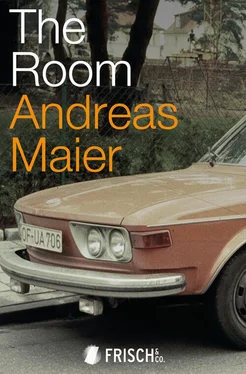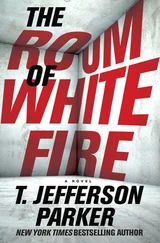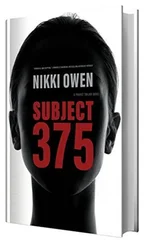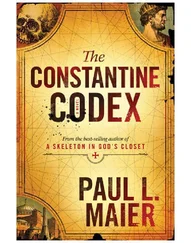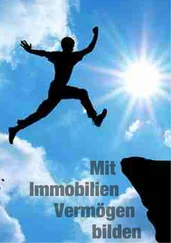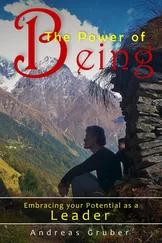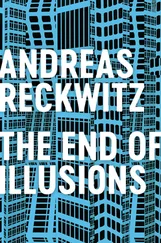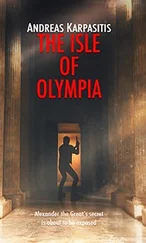Now my uncle is on his way up to the Winterstein. The Variant is struggling noticeably. The path goes straight uphill and is tarmacked. Half-way along, a light comes towards him, a vehicle, and suddenly an American is standing before him on the side of the road in full uniform, shining a light into his face and shouting, Stop ! The American, like all Americans in the Wetterau, has a chalk-white face that’s visible even at night. He seems agitated and frantic, coming up alongside the car and making gestures which my uncle takes to mean that he should pull over to the side of the road. My uncle pulls over and stops the car. Now there are suddenly another two Americans there too, who seem to have come out of the forest. One is smoking, and all three have American soldier’s helmets on and seem occupied with something. Now an off-road vehicle comes driving past, but without taking any notice of the three soldiers. One of the Americans is speaking into a walkie-talkie. My uncle gets out of his car.
Hey you , calls one of the Americans.
I , says my uncle. He can’t actually speak English.
Yes you , calls the American, grimacing as if disgusted that a German would have to turn up here at this precise moment.
As my uncle has not mastered English, with the exception of words like I or you and yes and no (essential tools for understanding the occupying forces), he is of course unable to follow what the American is about to say to him. The American waves his machine gun in my uncle’s direction, with the result that J chooses to stay close by the Variant. And now, softly and from afar, a noise that my uncle is familiar with resounds out. All four of them, the three Americans and my German uncle, look up the road. A light shines down the road from above, the noise gets louder, a second light becomes visible behind the first, and they come rolling down one after the other, almost too wide for the road. It’s not implausible that my uncle knows the tank models and is able to identify them, just like the birds in the forest and the meadow, or at the very least he would have claimed that he knew them, but perhaps he doesn’t know them after all and is just overwhelmed by excitement. They get bigger and bigger and louder and louder, shining their headlights on each other, turning into the forest path one after the other. My uncle can see the first one clearly now, its immense gun pointing straight ahead as if the gunman wanted to shoot the way clear and perhaps even sweep the Variant from the road, and an American is looking out from the top and has a helmet on and is allowed to drive the tank and maybe has full responsibility for it, controlling everything and with everything under control and his chalk-white face looking important and officious and stern all at the same time. Even though the tanks are already very close in the darkness, they keep getting bigger and bigger, and then they glide past my uncle on the Winterstein forest path, immense, raucous metal mountains, and no one can hear themselves think anymore, and the Americans can’t make out each others’ words, so a rapprochement is out of the question. The tanks and the Americans staring out of them roll heedlessly past the group of people by the Variant, each of the Americans with his gaze fixed as straight ahead as the tank he is on, or so it seems to my uncle, as if they had grown up together and belonged together always, and it would be impossible to think of them any other way, and yet my uncle, back when they had military shows on the Friedberg fairground, wasn’t even allowed into the little German armoured reconnaissance tank, because he was no longer a child and in any case had the appearance of someone you preferably wouldn’t want to put anywhere. My uncle had never been in a tank. He lived without it; it was only the longing that endured forever, something he was only ever able to dream of. The Winterstein, which during his lifetime was not just the Forsthaus and the TV tower but also the tank road of the Americans, who had come to the country twenty-four years ago but remained ever-young while the Wetterauers got older and older. Occupied Wetterau. My uncle didn’t like Americans. But he did like their tanks. They continue to roll past him, and my uncle stares with his eyes protruding from his head again, longing to have an expert discussion with the soldiers (soldiers in uniform, and there in the forest on a tank exercise to boot, the very highest level of Being) about the tanks and their construction and all their details and technical data, but unfortunately that wasn’t possible due to the language barrier between him, the occupied Wetterauer, and his occupiers. And also because of the awful noise that is currently engulfing the forest road as my uncle stands there next to his Variant. Has he ever been this close to the tanks before? He can almost reach out and touch them; they’re not moving quickly. And now the convoy has passed, an off-road vehicle bringing up the rear, and even the three soldiers on foot are moving away from the scene of the incident. My uncle stands alone in the beam of light that’s coming from his Variant. The tarmacked street has been transformed into a wasteland of sludge and mud clumps and is barely passable. During these years, the Americans would turn up with their tanks every few days, making half of the Winterstein impassable, and in the Wetterau Zeitung they would quarrel about why it was always the Germans who had to clear it all up afterwards. Or, to be more precise, the Wetterauers. They didn’t just quarrel in the newspaper, but in Jagdhaus Ossenheim too, in the Goldenen Fass, in Hanauer Hof, in the Licher-Eck (if indeed it existed back then), in the Alter Schmiede, in the Schillerlinde, in the Dunkel, in the Deutsche Haus, in the Krone, and last but not least and above all in Forsthaus Winterstein. Because if you go to Forsthaus Winterstein on a day like this, you’ll need to wash your car straight after. The mud and the slime is spread out on the road all the way to Ockstadt and down to the Friedberg barracks. Some of the metre-long clumps of earth held on for a while, riding the tanks all the way to Friedberg before splatting down on the street and — in doing so — dirtying the whole of the district capital so that everyone always knew: These are the Americans, and you are occupied. And then the Friedbergers would stand before the clods of mud on their road, become inflamed by rage and have to go for a quick beer, and ideally a schnapps too, in order to cope. Exactly how many glasses of beer and how many schnapps were drunk as a result of the dirtying of the little German town of Friedberg in the Wetterau by the occupying powers of the United States of America, no one knows: Bad Nauheim, where the Americans lived, always remained clean, and Friedberg was always soiled. By now, the rumble of the tanks has become quieter, almost non-existent. My uncle gets into his car and struggles to drive over the mud left by the tanks’ tracks; the wheels spin here and there, and within seconds everything is clinging onto the undercarriage, making the Variant heavy and then heavier. But now there are only a few hundred metres to the tank ramp, and from then on the road is in an orderly condition, because the tanks don’t drive there, or at least they’re not allowed to, and the Americans aren’t allowed to set foot in the Forsthaus either (it’s ‘off-limits’). The Winterstein is divided into two, back in ’69 there was the civilian German zone and the American exclusion zone, fenced off and equipped with signs including words like:
Immediate Use of Firearms!
In German, mind you, so that it could be understood.
Sofortiger Schußwaffengebrauch!
Sometimes, you would see the Americans on the road at night. But then again, to me, with their white faces they always seemed devoid of light. At night, these faces had a tendency to gleam. You could see them from afar, and you were best advised to let the occupying forces have the right of way, for beatings were commonplace, while at the same time the white-faced Americans would meet with the German Fräuleins , as the soldiers called them, in the back-rooms of local bars for communal getting-to-know-you sessions. Even at home, on the old company premises, my entire youth was lived in the constant presence of American soldiers, sometimes the whole terrace was full of them. None of these Americans ever saw the inside of our bars, not the Dunkel, not the Schillerlinde, nor the Lascaux, where I spent my youth, a cellar tavern in which even we became lightless figures, running around like rats and slowly grasping something about the world that we were never to forget.
Читать дальше
